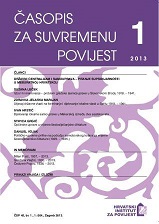Djelovanje lokalne samouprave u Makarskoj između dva svjetska rata
THE LOCAL SELF-GOVERNMENT IN MAKARSKA BETWEEN WORLD WARS
Author(s): Ivan HrstićSubject(s): History
Published by: Hrvatski institut za povijest
Keywords: Makarska; Local self-government; Kingdom of Yugoslavia
Summary/Abstract: The paper analyzes the development of local self-government in the Kingdom of Serbs, Croats and Slovenians (Kingdom of Yugoslavia) during the interwar period, using the town of Makarska as a case-study. The research is based on original archival sources, available periodicals and relevant literature. At that time Makarska was the seat of Makarska-Littoral municipality as well as Makarska district, which was constituted of Makarska-Littoral, Upper Littoral and Vrgorac municipalities. Although Makarska had the status of town, the municipality functioned as a rural one. Throughout the studied period the state was characterized by a great subordination of periphery to the center and centralized government, while municipalities, as the lowest self-governing units, had very limited powers. However, municipalities still had a independent sphere of action and authority, so the regime tried hard to undermine that autonomy. Therefore, political conflicts of local governments and the central regime are not surprising. At the same time, municipal self-governments represented the only possibility of action by opposition parties, led by Croatian Peasant Party. It was because the system of electing representatives to the National Assembly was organized to assure the majority to regime parties. Unwillingness of the state structures to resolve the situation is evident from the fact that the harmonization of municipality legislation was postponed up to 1933. Until then municipalities were functioning according to the laws adopted before 1918, which in turn greatly differed from province to province. However, the adoption of these laws in 1933 and 1934 did not mark the beginning of the unobstructed functioning of municipal self-governments, as similar practices persisted. Decisive role in the political life of Makarska had the Head of the District, who was a state official. Political affairs at the state level were directly reflected in the choice of the municipal administration, which resulted in relatively frequent changes of municipal officials. The municipality of Makarska-Littoral during the studied period was mostly governed by appointed officials, and not elected ones, so it can be concluded that there was no realization of the principle of the subsidiarity. Therefore, the existence of self-government has not fulfilled its purpose. Based on the available literature and sources it can be also concluded that the similar conditions prevailed in other municipalities in Dalmatia, as well as in other regions. All important decisions regarding the appointment of mayors and municipal councils were taken by the central government completely on its own or in consultations with their representative on the field, i.e. the Head of the District. In order to this practice, residents, who were represented by those appointed municipal managers, were not participating in those decisions at all.
Journal: Časopis za suvremenu povijest
- Issue Year: 45/2013
- Issue No: 1
- Page Range: 65-88
- Page Count: 24
- Language: Croatian

